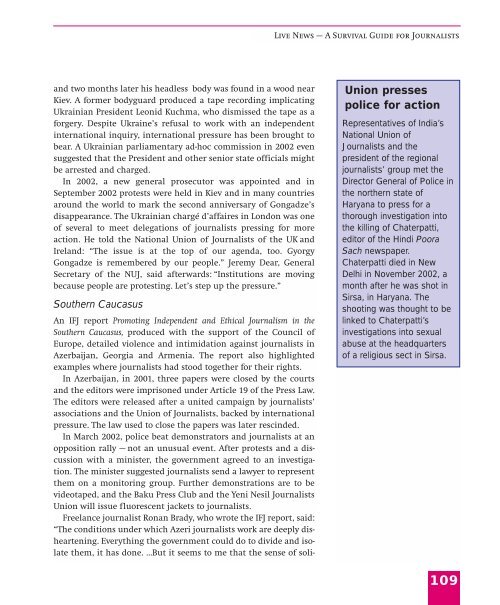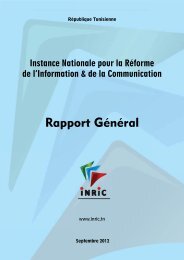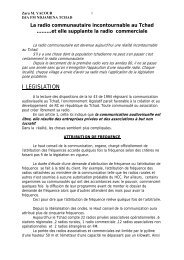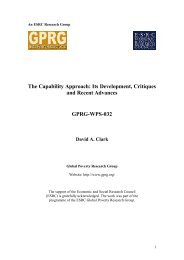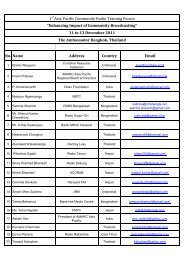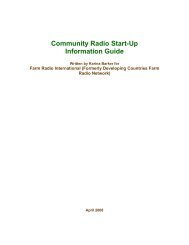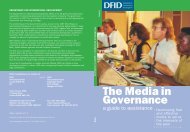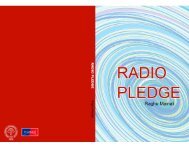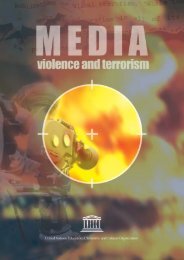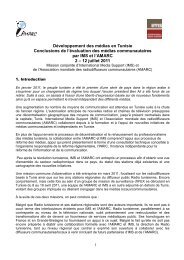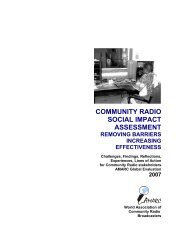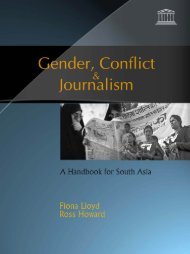Live News - A Survival Guide - International Federation of Journalists
Live News - A Survival Guide - International Federation of Journalists
Live News - A Survival Guide - International Federation of Journalists
- No tags were found...
You also want an ePaper? Increase the reach of your titles
YUMPU automatically turns print PDFs into web optimized ePapers that Google loves.
<strong>Live</strong> <strong>News</strong> — A <strong>Survival</strong> <strong>Guide</strong> for <strong>Journalists</strong>and two months later his headless body was found in a wood nearKiev. A former bodyguard produced a tape recording implicatingUkrainian President Leonid Kuchma, who dismissed the tape as aforgery. Despite Ukraine’s refusal to work with an independentinternational inquiry, international pressure has been brought tobear. A Ukrainian parliamentary ad-hoc commission in 2002 evensuggested that the President and other senior state <strong>of</strong>ficials mightbe arrested and charged.In 2002, a new general prosecutor was appointed and inSeptember 2002 protests were held in Kiev and in many countriesaround the world to mark the second anniversary <strong>of</strong> Gongadze’sdisappearance. The Ukrainian chargé d’affaires in London was one<strong>of</strong> several to meet delegations <strong>of</strong> journalists pressing for moreaction. He told the National Union <strong>of</strong> <strong>Journalists</strong> <strong>of</strong> the UK andIreland: “The issue is at the top <strong>of</strong> our agenda, too. GyorgyGongadze is remembered by our people.” Jeremy Dear, GeneralSecretary <strong>of</strong> the NUJ, said afterwards: “Institutions are movingbecause people are protesting. Let’s step up the pressure.”Southern CaucasusAn IFJ report Promoting Independent and Ethical Journalism in theSouthern Caucasus, produced with the support <strong>of</strong> the Council <strong>of</strong>Europe, detailed violence and intimidation against journalists inAzerbaijan, Georgia and Armenia. The report also highlightedexamples where journalists had stood together for their rights.In Azerbaijan, in 2001, three papers were closed by the courtsand the editors were imprisoned under Article 19 <strong>of</strong> the Press Law.The editors were released after a united campaign by journalists’associations and the Union <strong>of</strong> <strong>Journalists</strong>, backed by internationalpressure. The law used to close the papers was later rescinded.In March 2002, police beat demonstrators and journalists at anopposition rally — not an unusual event. After protests and a discussionwith a minister, the government agreed to an investigation.The minister suggested journalists send a lawyer to representthem on a monitoring group. Further demonstrations are to bevideotaped, and the Baku Press Club and the Yeni Nesil <strong>Journalists</strong>Union will issue fluorescent jackets to journalists.Freelance journalist Ronan Brady, who wrote the IFJ report, said:“The conditions under which Azeri journalists work are deeply disheartening.Everything the government could do to divide and isolatethem, it has done. …But it seems to me that the sense <strong>of</strong> soli-Union pressespolice for actionRepresentatives <strong>of</strong> India’sNational Union <strong>of</strong><strong>Journalists</strong> and thepresident <strong>of</strong> the regionaljournalists’ group met theDirector General <strong>of</strong> Police inthe northern state <strong>of</strong>Haryana to press for athorough investigation intothe killing <strong>of</strong> Chaterpatti,editor <strong>of</strong> the Hindi PooraSach newspaper.Chaterpatti died in NewDelhi in November 2002, amonth after he was shot inSirsa, in Haryana. Theshooting was thought to belinked to Chaterpatti’sinvestigations into sexualabuse at the headquarters<strong>of</strong> a religious sect in Sirsa.109


